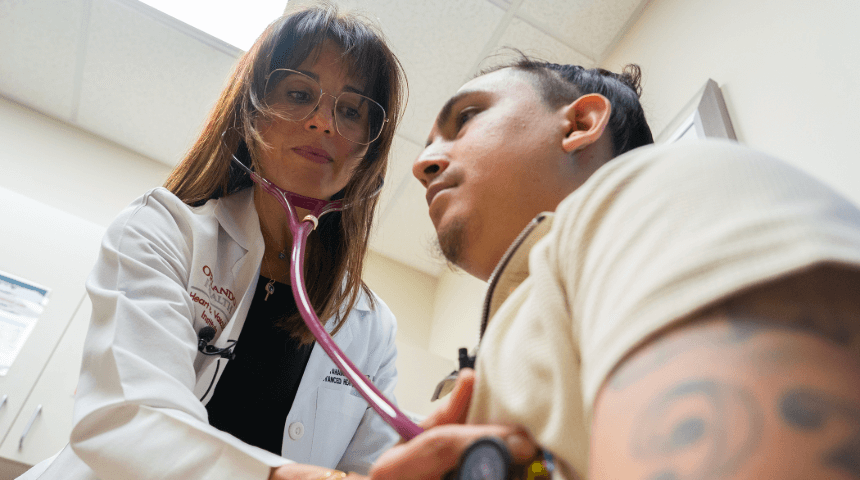Heart disease doesn’t happen suddenly. It tends to creep into your life slowly, with symptoms that are often easy to ignore in the early going.
As you hit your 40s, 50s and beyond, it becomes more important to keep an eye out for these warning signs, particularly if heart disease runs in your family. Any of these symptoms alone – particularly if occurring frequently – can be enough to warrant a trip to your doctor or cardiologist.
And you should understand that while chest pain is the most common symptom of a heart attack, men and women may experience others symptoms differently. Women are more likely, for example, to have shortness of breath, nausea and jaw pain.
Chest Pain
Chest pain can vary from person to person, but it’s commonly described as a feeling of pressure or tightness in the center or left side of the chest. It may feel like something is sitting or pressing on your chest. Often, it’s accompanied by nausea or difficulty catching your breath.
Chest pain can be a symptom of health problems in numerous areas of the body, including your lungs, gastrointestinal system, muscles, nerves and bones. With the heart, it can be a symptom of several conditions, including:
- Coronary artery disease (blockage of the heart’s blood vessels)
- Myocardial infarction (heart attack)
- Myocarditis (heart muscle inflammation)
- Pericarditis (inflammation in the sac around the heart)
- Hypertrophic cardiomyopathy (a genetic disease that causes thickening of the heart muscle)
- Mitral valve prolapse (a condition that prevents the heart valve from closing properly)
Stomach Pain or Indigestion
This is a general burning sensation in your chest or stomach. One of the first things to consider is whether it happens after you’ve eaten a meal. If so, it may be nothing more than heartburn – a common condition caused by stomach acids rising up into your esophagus. It can cause pain that radiates into your neck and higher. If you belch and the pain goes away, it’s more likely to be unrelated to your heart.
More concerning is when the feeling comes on after physical exertion or several hours after your last meal. Heart trouble may also be indicated if the pain is accompanied by other symptoms, including sweating or shortness of breath.
Excessive Sweating
Sweating after a good workout or afternoon of yardwork isn’t unusual. But if sweat is dripping off you while sitting on the couch watching TV, this is a sign of potential trouble. When the arteries become clogged, your heart is forced to work harder to keep blood flowing. In response, your body sweats to keep your temperature down.
Night sweats are a common symptom in women who are having heart problems, though the symptom is sometimes mistaken as a sign of menopause.
Arm or Leg Pain
Pain in the left arm is one of the most common symptoms of heart attack. That’s because the nerves that branch out of the heart share the same brain cells that send signals to the arm. When trouble occurs, your brain can’t tell the difference between the two sources, creating something known as referred pain. That arm pain also could indicate angina, a heart problem caused by clogged or narrowed coronary arteries. And while the pain is more common in the left arm, it’s possible for it to be found in the right arm or in both arms at the same time.
Pain in the legs is often a symptom of peripheral vascular disease (PVD), a circulation disorder in which your legs don’t receive enough blood flow to match your body’s demands. If you experience this, your doctor may want to look at your heart as well, since the body’s plumbing system runs together. A blockage in the legs could lead to the discovery of trouble further upstream.
Extreme Fatigue
This one can be difficult to assess. After all, who doesn’t feel tired these days? And there are other conditions – depression, for example – that share fatigue as a symptom. If you are too tired to get out of bed in the morning, that may be something else. But if you’re dealing with an abrupt and substantial decrease in endurance, it could be your heart. Maybe you were recently walking a mile or two a day – and suddenly you’re exhausted after half a block.
Jaw Pain or Neck Tightness
This is related to arm pain, since some of those nerves also run through your neck. This could show up as pain in your jaw – it could even feel like a toothache – as you walk or exert yourself. There are a couple of clues that indicate a relationship to your heart. Tooth pain, for example, isn’t something that goes away with rest or because you’ve taken a nitroglycerin tablet.





